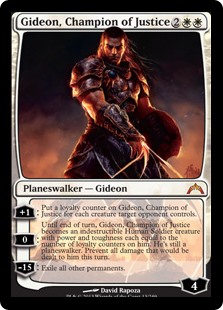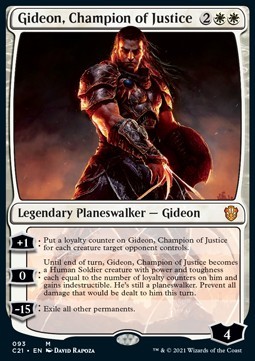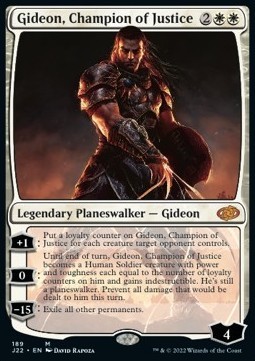2013-01-24
You put a loyalty counter on Gideon, Champion of Justice as part of the cost of activating the first ability. When that ability resolves, you count the number of creatures controlled by the target opponent and put that many additional loyalty counters on Gideon.
2013-01-24
If the first ability is countered (perhaps because the target opponent is an illegal target when the ability tries to resolve), you won't put any additional loyalty counters on Gideon, although the loyalty counter you put on him to activate the ability will remain.
2013-01-24
If Gideon, Champion of Justice becomes a creature due to his second ability, that doesn't count as having a creature enter the battlefield. Gideon was already on the battlefield; he only changed his types. Abilities that trigger whenever a creature enters the battlefield won't trigger.
2013-01-24
Gideon, Champion of Justice's power and toughness are set to the number of loyalty counters on him when his second ability resolves. They won't change later in the turn if the number of loyalty counters on him changes.
2013-01-24
If Gideon, Champion of Justice becomes a creature the same turn he enters the battlefield, you can't attack with him or use any of his

abilities (if he gains any).
2013-01-24
Gideon, Champion of Justice's second ability causes him to become a creature with the creature types Human and Soldier. He remains a planeswalker with the planeswalker type Gideon. (He also retains any other card types or subtypes he may have had.) Each subtype is correlated to the proper card type: Gideon is just a planeswalker type (not a creature type), and Human and Soldier are just creature types (not planeswalker types).
2013-01-24
Say you activate Gideon, Champion of Justice's second ability, and then an opponent gains control of him before combat. You may have any of your creatures attack Gideon, Champion of Justice (since he's still a planeswalker). Then Gideon, Champion of Justice may block (since he's a creature). He may block any eligible attacking creature, including one that's attacking him! During combat, he behaves as an attacked planeswalker and/or a blocking creature, as appropriate. For example, he deals combat damage to any creatures he's blocking, but he doesn't deal combat damage to any unblocked creatures that are attacking him.
2013-07-01
If damage that can't be prevented is dealt to Gideon, Champion of Justice after his second ability has resolved, that damage will have all applicable results: specifically, the damage is marked on Gideon (since he's a creature) and that damage causes that many loyalty counters to be removed from him (since he's a planeswalker). Even though he has indestructible, if Gideon, Champion of Justice has no loyalty counters on him, he's put into his owner's graveyard as a state-based action.
2013-07-01
Planeswalkers are permanents. You can cast one at the time you could cast a sorcery. When your planeswalker spell resolves, it enters the battlefield under your control.
2013-07-01
Planeswalkers are not creatures. Spells and abilities that affect creatures won’t affect them.
2013-07-01
Planeswalkers have loyalty. A planeswalker enters the battlefield with a number of loyalty counters on it equal to the number printed in its lower right corner. Activating one of its abilities may cause it to gain or lose loyalty counters. Damage dealt to a planeswalker causes that many loyalty counters to be removed from it. If it has no loyalty counters on it, it’s put into its owner’s graveyard as a state-based action.
2013-07-01
Planeswalkers each have a number of activated abilities called “loyalty abilities.” You can activate a loyalty ability of a planeswalker you control only at the time you could cast a sorcery and only if you haven’t activated one of that planeswalker’s loyalty abilities yet that turn.
2013-07-01
The cost to activate a planeswalker’s loyalty ability is represented by a symbol with a number inside. Up-arrows contain positive numbers, such as “+1”; this means “Put one loyalty counter on this planeswalker.” Down-arrows contain negative numbers, such as “-7”; this means “Remove seven loyalty counters from this planeswalker.” A symbol with a “0” means “Put zero loyalty counters on this planeswalker.”
2013-07-01
You can’t activate a planeswalker’s ability with a negative loyalty cost unless the planeswalker has at least that many loyalty counters on it.
2013-07-01
Planeswalkers can’t attack (unless an effect turns the planeswalker into a creature). However, they can be attacked. Each of your attacking creatures can attack your opponent or a planeswalker that player controls. You say which as you declare attackers.
2013-07-01
If your planeswalkers are being attacked, you can block the attackers as normal.
2013-07-01
If a creature that’s attacking a planeswalker isn’t blocked, it’ll deal its combat damage to that planeswalker. Damage dealt to a planeswalker causes that many loyalty counters to be removed from it.
2013-07-01
If a source you control would deal noncombat damage to an opponent, you may have that source deal that damage to a planeswalker that opponent controls instead. For example, although you can’t target a planeswalker with Shock, you can target your opponent with Shock, and then as Shock resolves, choose to have Shock deal its 2 damage to one of your opponent’s planeswalkers. (You can’t split up that damage between different players and/or planeswalkers.) If you have Shock deal its damage to a planeswalker, two loyalty counters are removed from it.
2013-07-01
If a player controls two or more planeswalkers that share a planeswalker type, that player chooses one of them and the rest are put into their owners’ graveyards as a state-based action.
 Gatecrash
Gatecrash













